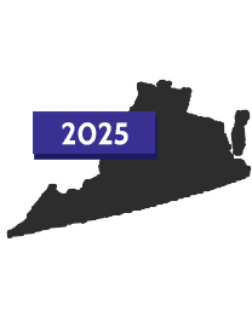|
|
| See guides.vote for online guides with links & sources |
https://vademocrats.org/
|
https://virginia.gop/
|
Abortion
|
- Passed a bill shielding Virginia abortion providers from extradition to another state, vetoed.
- Repealed previous abortion restrictions. These include the mandatory ultrasound law, the 24-hour abortion waiting period, and state-mandated counseling for those seeking an abortion.
- Removed restrictions on women's health centers.
| |
Climate Change
|
- Passed a bill increasing access to shared solar.
- Passed a bill to make the Virginia electric grid carbon-free by 2050.
- Created a carbon dioxide cap and trade program and a shared solar program.
- Joined the Regional Greenhouse Gas Initiative and adopted California regulations that set stringent vehicle emissions standards and set targets for electric car sales.
|
- Tried to block efforts to make the Virginia electric grid carbon-free by 2050 and tried to pull Virginia out of the Regional Greenhouse Gas Initiative.
- Passed a bill funding “innovative energy technologies,” including nuclear, hydrogen, and carbon capture, with support from most Democrats.
- Passed a bipartisan bill funding a small modular nuclear reactor.
|
Criminal Justice
|
- Abolished the death penalty.
- Passed policing changes. These include banning chokeholds and no-knock arrest warrants, downgrading minor traffic violations, and creating mental health response teams.
- Established the chance for some prisoners to earn early release dates and ensured defendants the right to seek a jury trial without risking higher sentences.
|
- Mostly opposed ending the death penalty.
- Tried to repeal Democratic policing changes, launching bills that would end prohibitions against “bias-based profiling” and would stop de-emphasizing minor traffic violations.
- Passed a bill classifying fentanyl as a weapon of terrorism, with support of most Democrats in the Senate and one Democratic House vote.
- Passed a bipartisan bill that gives in-state tuition to out-of-state students who are victims of human trafficking.
|
Education
|
- Passed a bill providing tuition-free community college for low- to middle-income students, with support of most Republicans.
- Passed with some Republican support a requirement that each school board provide at least three specialized student support positions, such as social workers, nurses, and school psychologists.
|
- Passed a requirement for the Virginia Department of Education to issue model policies for school boards to adopt on “sexually explicit content in instructional material.”
- Tried to pass public funding for families to pay for private school. Sought to ban transgender athletes and the teaching of “inherently divisive subjects.”
|
Gun Laws
|
- Passed an assault weapons ban, vetoed.
- Passed a “red flag” bill. It allows a judge to temporarily remove firearms from someone deemed a threat.
- Passed a bill that allowed localities to ban guns in certain public spaces.
- Established background checks, prohibited firearms within 40 feet of a polling place, and required gun owners to report lost or stolen firearms.
|
- Opposed an assault weapons ban.
- Opposed a “red flag” bill that allows a judge to temporarily remove firearms from someone deemed a threat.
- Opposed a bill establishing background checks.
- Rejected in committee a bill that would require locked storage of firearms and ammunition in a residence where a minor is present.
|
Health Care
|
- Created a state-run health insurance exchange that ended Virginia's reliance on the federal marketplace.
- Passed an affordability board to reduce drug costs, vetoed.
- Passed Medicaid expansion with some Republican support.
|
- Opposed the state-run health insurance exchange that ended Virginia's reliance on the federal marketplace.
- Mostly opposed creation of an affordability board to reduce drug costs.
|
LGBTQ Rights
|
- Passed a bill protecting same-sex marriage, with limited Republican support.
- Passed a bill that extended existing state non-discrimination protections to LGBTQ people in housing, employment, and public accommodation.
- Passed a repeal of prohibitions on same-sex marriages and civil unions, with some Republican support.
|
- Tried to create exemptions to the Virginia Human Rights Act that would allow faith-based entities to deny services to LGBTQ people.
- In 2012 passed a bill that allowed private child-placing agencies to refuse adoption placement, if “placement would violate the agency's written religious or moral convictions.” The bill passed with six Democratic votes.
|
Marijuana
|
- Decriminalized marijuana, then legalized it. Allowed personal possession and cultivation of small quantities of cannabis by adults 21 and older.
- Delayed full legalization and retail sales until 2024 and left implementation details open to review.
- Tried in 2024 and 2025 to establish a framework for a retail marijuana market. Both attempts were vetoed.
|
- Opposed marijuana legalization.
- Blocked attempts to speed up recreational marijuana sales.
- Blocked 2023 attempts to set up retail marijuana sales by 2024.
- Opposed the 2024 and 2025 attempts to establish a framework for a retail market.
|
Minimum Wage
|
- Increased the minimum wage in 2020 from $7.25 gradually to $12 by 2023.
- Tried in 2024 to raise the minimum to $13.50 and in 2025 to raise it to $15. Both attempts were vetoed.
- Passed a bill that limited the use of subminimum wages for employees with disabilities, ending them by July 2030. It passed with unanimous Republican support in the House.
|
- Opposed a 2020 minimum wage increase to $12 by 2023.
- Opposed wage increase attempts in 2024 and 2025.
- Tried to freeze, limit, or add exemptions to scheduled wage increases. These attempts were passed in a Republican House but defeated in a Democratic Senate.
- Tried to lower the minimum wage for under-18 youth.
- In the House voted unanimously to end subminimum wages for employees with disabilities; opposed in Senate.
|
Voting Rules
|
|
- Tried to end the use of drop boxes, limit absentee in-person early voting to two weeks preceding an election, and restrict election-day voter registration.
- Tried to pass new photo-ID requirements for voting.
- In 2013 implemented mandatory voter photo ID.
- In 2012 eliminated a provision that allowed a voter without ID to sign a sworn statement attesting to their identity.
|






